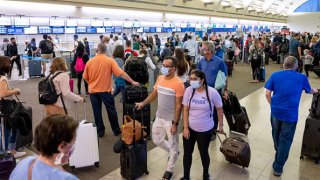
- Air travel complaints rose nearly 18% in June from a month earlier, the U.S. Department of Transportation said Friday.
- More than half of the complaints were related to trip refunds, it said.
Air travelers' complaints to the federal government jumped nearly 18% in June from a month earlier as flight cancellations and other disruptions rose, the Department of Transportation said Friday.
The DOT received 4,176 complaints about air service in June, more than 55% of them involving refunds. It also received one compliment but did not immediately say which airline or topic it was about.
Airlines struggled with staffing shortages this summer, the result of a surge in air travel demand that exceeded their expectations. Earlier in the pandemic the airlines had urged thousands of employees to take retirement or leaves to cut costs.
We're making it easier for you to find stories that matter with our new newsletter — The 4Front. Sign up here and get news that is important for you to your inbox.
Ten U.S. airlines canceled 1.6% of the 573,779 domestic flights they scheduled in June, almost four times the rate compared with May, the DOT said. The on-time rate fell to 74.6% from 86.2% a month earlier.
Hawaiian Airlines, Delta Air Lines and Alaska Airlines had the best on-time rates in June at 87.7%, 86.8% and 80.7%, respectively. Allegiant Air had the lowest on-time arrival rate of the 10 airlines at 56.6%, followed by Southwest Airlines at 62.4% and JetBlue Airways at 65.1%.
American Airlines came in fourth place in on-time arrivals at 74.3%, with Spirit Airlines at 74.1%, United Airlines at 73.9%, and Frontier Airlines at 69.5%.
Money Report
Dallas-based Southwest had a pair of technology failures in June that contributed to flight cancellations and delays.
The DOT data does not cover the late July and early August meltdown at Spirit after the carrier canceled more than 2,800 flights during a spate of bad weather, technology problems and staffing shortages. American also canceled hundreds of flights in early August after bad weather at its Dallas/Fort Worth International Airport hub combined with staffing shortfalls.
Earlier this week, American said it paused plans to close down a pilot training center in Charlotte, North Carolina, because of the need for more pilots to handle the surge in travel demand.






